Peter and Susan stop in their tracks as they find Lucy hugging the professor (Jim Broadbent) and sobbing into his stomach.
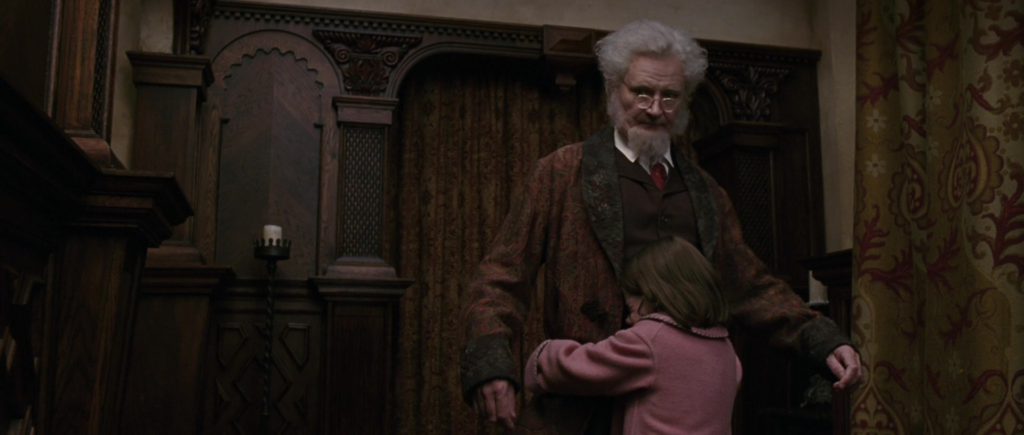
An angry Mrs. Macready appears. (“You children are one shenanigan shy of sleeping in the stable!”) The professor calms her down and sends Lucy with her to have some hot chocolate. Peter and Susan try to sneak away but he summons them to his office and not for hot chocolate.
Professor: You seem to have upset the delicate internal balance of my housekeeper.
Peter: We’re very sorry, sir. It won’t happen again.
Susan: It’s our sister, sir. Lucy.
Professor: The weeping girl.
Susan: She’s upset.
Professor: Hence the weeping.
Theoretically, as a fan of the book, I don’t really approve of making the character of the professor be this sarcastic, but Jim Broadbent’s dry deliver and comic timing are perfect, making this one of the funniest bits in the movie.[1]The 1988 miniseries portrays the professor as a goofy, bumbling, childlike eccentric and from what I understand, so do many stage adaptations. That actually strikes me as further removed from the … Continue reading Also, as a fan of the book, I’m a little miffed that Peter tries to stop Susan from telling the professor about the Lucy situation, saying that they two of them can handle it themselves. In the text, Peter is actually the one who advocates getting an adult involved, saying, “it’s getting beyond us.” To be fair though, since Susan is generally portrayed as being less often right than Peter or Lucy, there’s something to be said for having her be the one who knows when to ask for help, making things more nuanced.[2]You could also interpret Peter in the movie’s scene less as too proud to ask for help and more as not wanting his youngest sibling sent to an insane asylum.
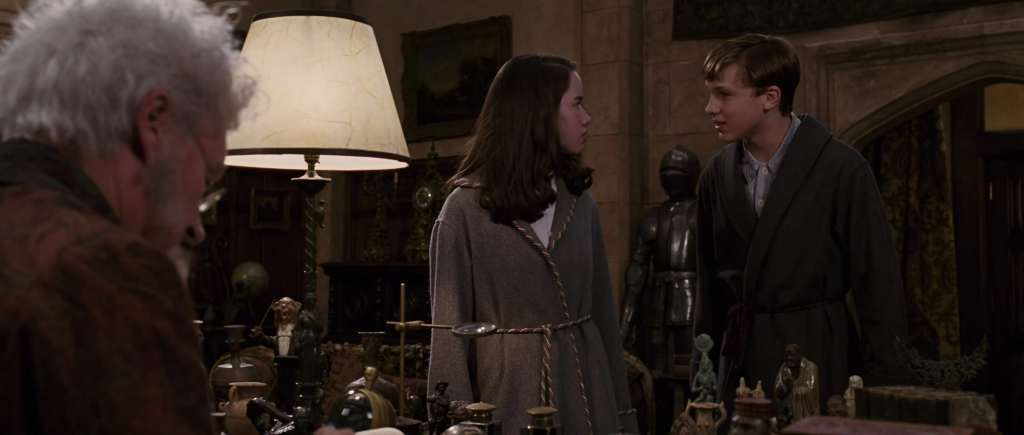
The professor’s intrigued reaction to hearing that Lucy believes she’s found a magical forest inside the upstairs wardrobe clearly indicates the filmmakers had the entire Narnia book series in mind, not just The Lion, the Witch and the Wardrobe. Some fans might find the scene overly full of fanservice, but I think it’s fair to point out that C. S. Lewis hadn’t worked out the professor’s entire backstory when he wrote the first Narnia book and if he had done so, he might have this scene more like the screenwriters did. Speaking for myself, this particular fan enjoyed the service.[3]In this context, “fanservice” means referring things that only fans will understand or remember, not anything to do with nudity.
Susan: She won’t stop going on about it.
Professor (awed): What was it like?
Susan: Like talking to a lunatic!
That line always makes me laugh. Anna Popplewell probably had the best comic timing of all the younger actors in this movie. Anyway, back to the conversation.
Professor: No, no, not her! The forest.
Peter: You’re not saying you believe her?
Professor: You don’t?
Susan: Well, of course not. I mean, logically it’s impossible.
Professor: What do they teach in schools these days?
That line was funnier in the book where it was something of a catchphrase for the character. (“I wonder what they do teach them at these schools.”) Peter points out that Edmund said he and Lucy were only pretending about Narnia. When the professor asks if Edmund is usually more truthful than Lucy though, Peter admits that it’s usually the other way around. “Well, if she’s not mad and she’s not lying, then logically we must assume she’s telling the truth,” Prof. Kirke says. This is his conclusion in the book too, but Peter and Susan brought up other objections to Lucy’s story there, mainly that there was nothing in the wardrobe when she showed it to them and that her alleged adventure took no time. I’m sympathetic to making movie adaptations faster paced than their literary source material but it’s unfortunate that it makes the character look less smart as they ignore obvious arguments to make. It’s also regrettable that the scene ends with the professor telling Peter and Susan they should believe Lucy on the grounds that “she’s your sister, isn’t she? You’re her family. You might just try acting like one.” In the book, it’s fun and surprising how the professor makes the case for believing Lucy with sheer reasoning and philosophical open-mindedness rather than appealing to sentiment. Plus, you know, Edmund is part of Peter and Susan’s family too and the professor isn’t advocating believing him. The book’s version of this exchange concludes rather unsentimentally with the professor telling them that a good way to deal with Lucy would be for everybody to try minding their own business. But I guess Hollywood can’t help itself from indulging in sappy speeches about love and family and good dental hygiene. Still, the movie’s version of the scene is still basically good in its way and, considering that it’s a dialogue driven scene, something that probably lends itself more to the page or the stage than screen, and one that isn’t strictly necessary to the plot, maybe Narnia fans should be grateful it was included at all.
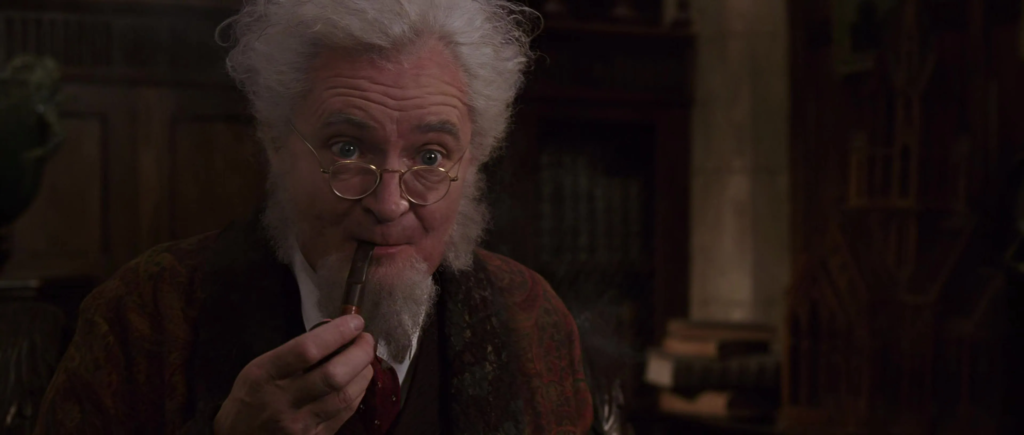
We cut to the Pevensies playing cricket outside the next day or some days later. Edmund is preoccupied, doubtless by thinking about the White Witch and her succulent Turkish Delight, and gets hit with a cricket ball, something I’m sure we all enjoy seeing after what he did to Lucy. “Wake up, Dolly Daydream,” says Peter. Why the filmmakers thought expression from the book like “by Jove” and “Great Scott” were too corny to use but the modern audiences would accept “Dolly Daydream” is beyond me but oh well.[4]I honestly do understand why the screenwriters didn’t use those expressions from the book since we now tend to associate them with comedic stereotypes of English people, not serious dramatic … Continue reading Edmund, probably trying to finagle a way to get back to Narnia, asks why they don’t play hide and seek again. Peter reminds him that he was the one that said it was a kids’ game. (Edmund didn’t actually say that that we heard but it’s easy to infer that he said it offscreen. The implication earlier was that Lucy was always trying to get her siblings to play hide and seek with her to their annoyance.) “Besides we could all use the fresh air,” says Susan. “It’s not like there isn’t air inside,” grumbles Edmund. That’s what I’d tell my mother when I was a kid and she pestered me to go out and get more fresh air.[5]Though not those exact words. It didn’t work on her. As Susan says the fresh air line, she glances at Lucy who is apart from the rest of the Pevensies, seated under a tree and looking rather sad. This is a bit different from the book which states at this point in the story that Peter and Susan by avoiding the subject of the wardrobe had managed to reach an understanding with her. I can understand the movie feeling that this would have been too time consuming to show. It’s also possible they felt having the characters be estranged for longer would make for better drama.
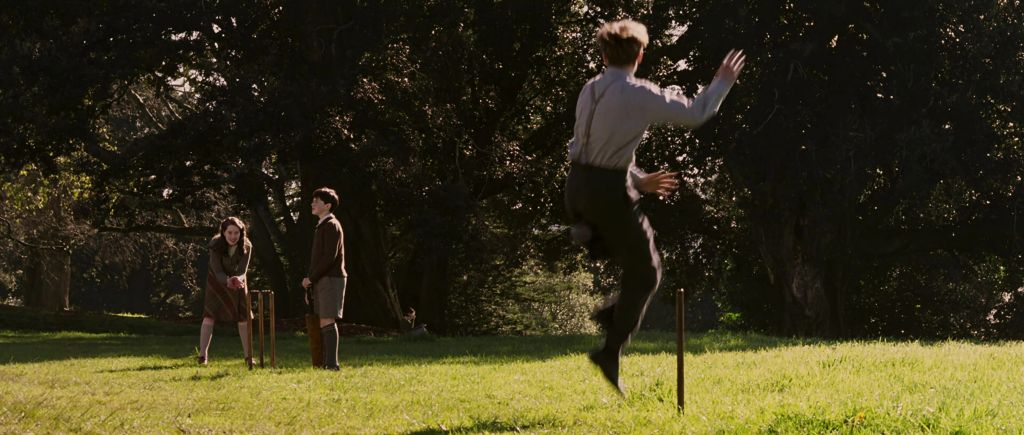
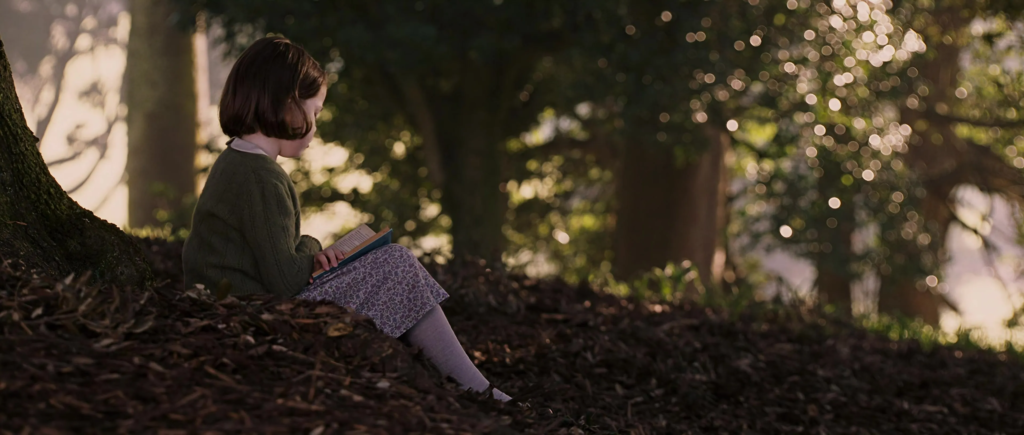
Peter pitches the ball again and this time Edmund hits it, smashing one of the stained-glass windows of the professor’s house in the process. Lucy’s expression when she looks up suggests she’s happy to see him get in trouble.
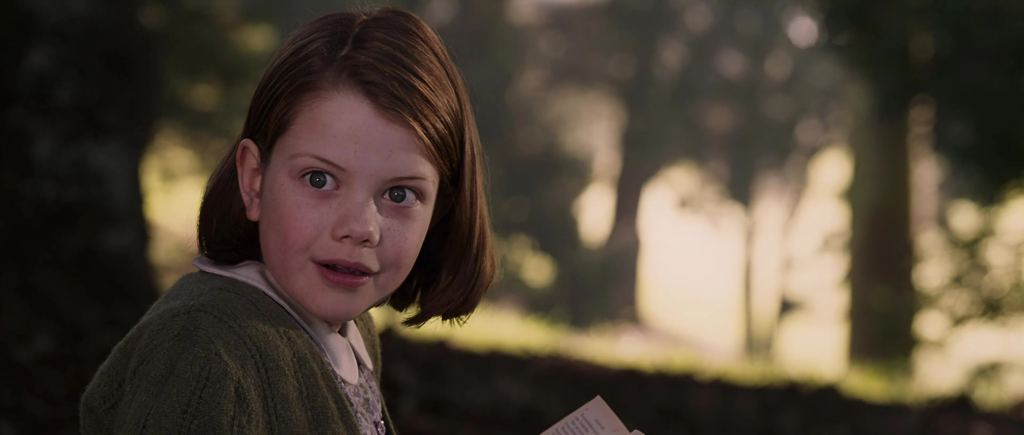
The Pevensies go inside to the scene of the crime and find that the cricket ball has also knocked over a suit of armor. Before Peter and Edmund can argue about which of them is at fault here, Mrs. Macready-or the Macready as they refer to her-is heard coming and they make a run for it. In the book, the characters are trying to avoid her because she’s giving a tour of the old house and has instructed them to keep out of her way.[6]A suit of armor does play a role in the book’s version of the scene albeit an inconsequential one. Edmund and Peter are looking at it “and wondering if they could take it to bits” … Continue reading I’ve read some fans opine that this change makes the characters sillier and considerably less mature than in the source material. (After all, it’s not like they can avoid facing up to the consequences for long, staying in the house as they are.) For whatever reason though, this doesn’t bug me. Maybe it would bug other viewers less if the movie made it clearer that we were supposed to laugh at the characters’ immaturity rather than playing exciting chase music on the soundtrack. I’ve got to say I love that music though. I also love the way no matter which direction the Pevensies run in this scene, they always seem to hear footsteps coming towards them, forcing them to change direction until they’re finally forced into the wardrobe room. This really captures the book’s equivalent scene which I mentioned in a previous post. (“Whether it was that they lost their heads or that Mrs. Macready was trying to catch them
or that some magic in the house had come to life and was chasing them into Narnia they seemed to find themselves being followed everywhere…”)
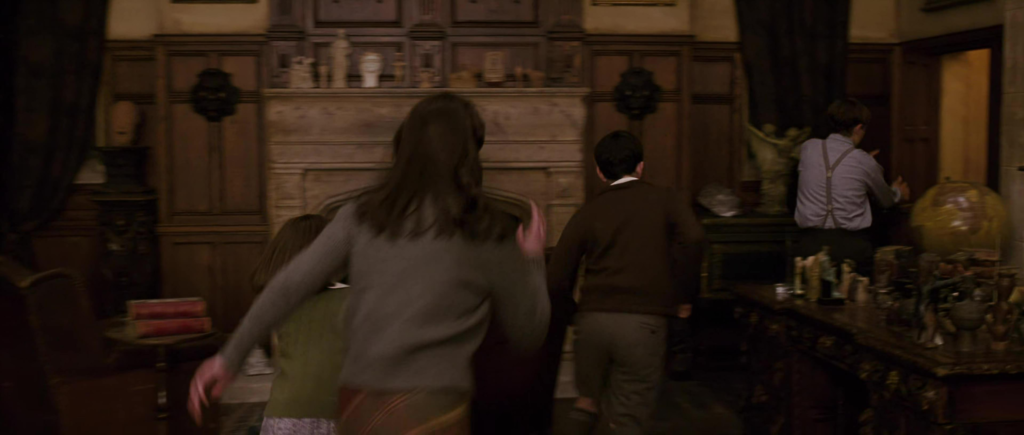
Edmund doesn’t stop running once they’re in the room but heads straight for the wardrobe flings open the door and impatiently urges the others to get inside. Doubtless, he’s thrilled by this unexpected opportunity to take his siblings to the Witch’s house and become king.[7]Could he have deliberately broken that window to orchestrate this? Nah, that’d be crazy! This is actually a tad different from the book. There, once Peter and Susan start to notice that it’s strangely cold and wet in the back of the wardrobe, Edmund actually says, “Let’s get out. They’ve gone,” his reluctance to let his older brother and sister know of his dishonesty momentarily winning out of over his lust for power and Turkish Delight. I like that kind of complex characterization in a book, but I imagine it would have just been confusing in a movie where it’s harder to establish Edmund’s goals. Anyway, Susan expresses incredulity at the suggestion they hide in the wardrobe but ultimately that’s what they do when they hear footsteps outside the door. As the children squeeze in together, Peter and Susan fall backwards and land in Narnia. They rise and gape at the landscape in amazement. This may not be quite as magical as the scene of Lucy seeing Narnia for the first time[8]It’d be weird if it was since we, the viewers, have now scene the place twice before. but that’s a high standard. It’s still a cool moment in its own right. In fact, this movie as a whole has a beautiful, childlike sense of awe and wonder.[9]This is especially impressive considering that the director’s main claim to fame prior to this was codirecting the Shrek movies, much of the comedy of which was about deflating childlike awe … Continue reading “Impossible,” breathes Susan. (Remember that line for the climax.)
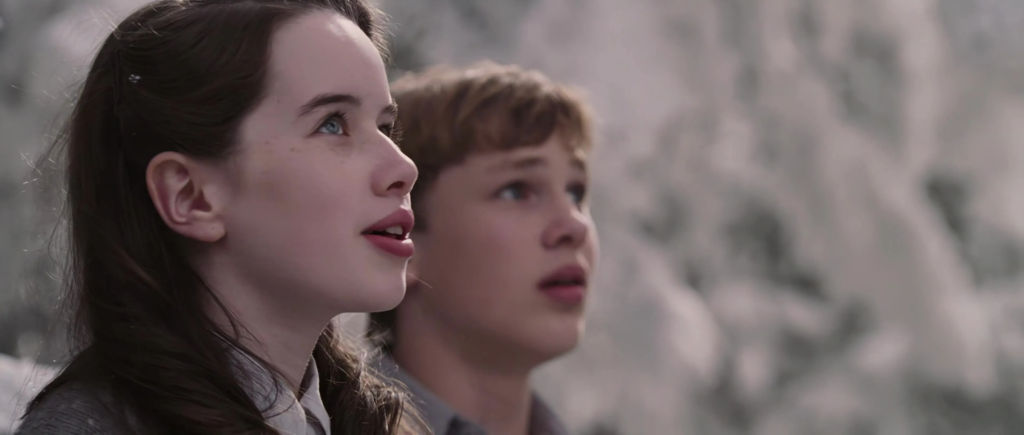
“Don’t worry,” says Lucy, “I’m sure it’s just your imagination.” That line makes her sound smugger and more vindictive than her character in the book. Some fans may object to that. What reconciles me to it is that both this movie and its two sequels will make Lucy the most idealized Pevensie, which she was in the books too but not quite to the same extent.[10]In the cinematic Voyage of the Dawn Treader, her main flaw will be that she doesn’t realize her own awesomeness. Suffice to say her weakness in the literary version was related but somewhat … Continue reading It’s good to have reminders that she’s not completely perfect. “I don’t suppose saying we’re sorry would quite cover it,” says Peter. That line could have easily sounded glib, but I have to give credit to William Moseley (and maybe to director Andrew Adamson.) He actually makes it sound like a heartfelt apology.[11]It may be significant that in both the book and the movie, Peter apologizes to Lucy, but Susan doesn’t. “No, it wouldn’t,” says Lucy before hitting him with a snowball, “but that might!” Peter and Susan laugh and start making snowballs of their own. It’s a nice, joyful moment. Edmund, looking sulky, refrains from joining the snowball fight and looks for the two hills the Witch pointed out to him. He’s interrupted by Susan throwing a snowball at him. “Stop it!” he cries, unwisely drawing attention to himself.
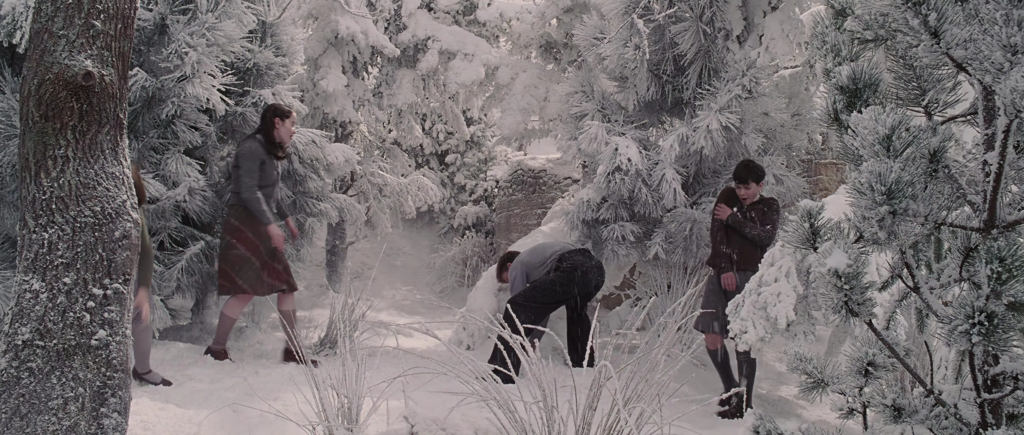
“You little liar!” says Peter. In the book, he and Susan don’t figure out that he lied about Narnia until he mentions that they should go near the lamppost, something Lucy never mentioned to any of them. I kind of enjoyed that since it’s fun to see Edmund accidentally give himself away after he’s been such a jerk. But I also understand the screenwriters feeling that Susan and Peter would naturally realize that he’d been lying once they saw Narnia for themselves. You could argue they tried to keep to the spirit of the book’s scene by having them only stop to realize Edmund’s duplicity after he draws their attention to himself. Peter insists Edmund apologize to Lucy. When he doesn’t, he moves toward him threateningly, Edmund quickly acquiesces. As you can guess, his apology doesn’t sound very sincere. “That’s alright,” says Lucy with a smirk. “Some little children just don’t know when to stop pretending.” Again, that makes her sound more vindictive than in the book though I doubt anyone watching isn’t on her side.
As in the book, Susan the peacekeeper tries to change the subject at this point. “Maybe we should go back,” she says. “Shouldn’t we at least take a look around?” asks Edmund, gesturing in the broad direction of the Witch’s house. “I think Lucy should decide,” says Peter, much to her gratitude. “I’d like you all to meet Mr. Tumnus,” she says. Susan objects to hiking in the snow in her summer clothing. “I’m sure the professor won’t mind us using these,” Peter says as he passes out fur coats. “Anyway, if you think about it logically, we’re not even taking them out of the wardrobe.” In the book, it’s Susan who makes that suggestion. It might have been nice to keep that since in both the books and this movie, Peter is portrayed as being right more often than Susan and this would have been an opportunity to make their relationship more nuanced and show a good side to her practicality. “But that’s a girl’s coat,” Edmund objects when Peter hands him the garment. “I know,” says Peter. The I’ll-Get-You-For-This look Edmund gives him is perfect.
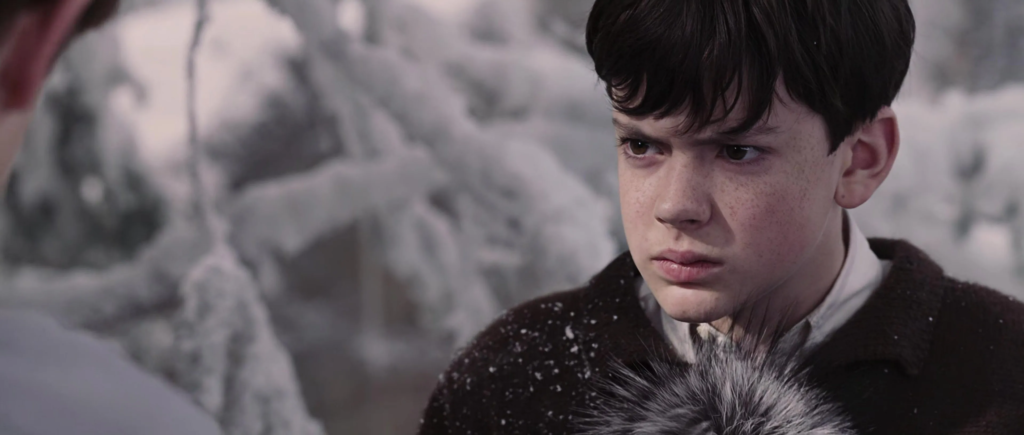
We get a little montage of Lucy leading the others through the forest as the musical theme from the opening credits returns. It does a good job of showing that she and Peter are delighted with Narnia, Edmund is unhappy, and Susan is somewhere in between.

As they’re in sight of cave, Lucy is telling her siblings how great it’ll be at Tumnus’s. Her voice trails off as she sees that the door to his home has been torn off its hinges. She gasps and runs toward the cave.
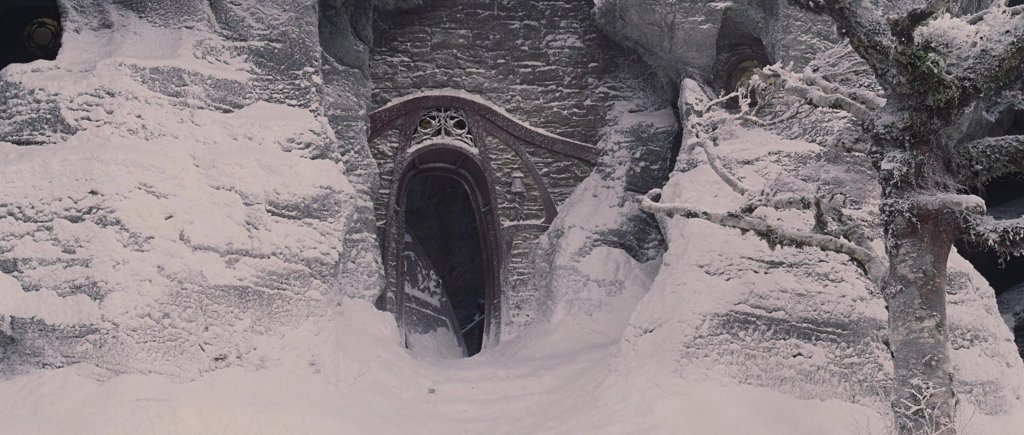
I’m sorry to say we are now leaving behind the most consistently strong portion of this movie. That’s not to say that everything from here on is going to be weak. Some of it will be wonderful. But it will be a long time before we get as many scenes in a row that I consider great as we’ve covered in these first four posts.
Next Week: We Take a Break from Narnia for Valentine’s Day
References
| ↑1 | The 1988 miniseries portrays the professor as a goofy, bumbling, childlike eccentric and from what I understand, so do many stage adaptations. That actually strikes me as further removed from the book’s characterization. If the professor absolutely has to be played for laughs, I think I’d prefer he be dryly sarcastic. |
|---|---|
| ↑2 | You could also interpret Peter in the movie’s scene less as too proud to ask for help and more as not wanting his youngest sibling sent to an insane asylum. |
| ↑3 | In this context, “fanservice” means referring things that only fans will understand or remember, not anything to do with nudity. |
| ↑4 | I honestly do understand why the screenwriters didn’t use those expressions from the book since we now tend to associate them with comedic stereotypes of English people, not serious dramatic characters. (And for many, it’d be impossible to hear “Great Scott” without thinking of Back to the Future.) There’s even a school of criticism that claims that such phrases weren’t even really used by kids in the 1940s or 50s and that C. S. Lewis’s use of them in the books reflect how out of touch he was with youth at the time. It would also would have been harder for the movie’s younger, less experienced actors to deliver them convincingly. But, as a fan of the Narnia books, I still admire adaptations that retain the Pevensies’ old-fashioned language even though I don’t believe it’s strictly necessary to do so. |
| ↑5 | Though not those exact words. |
| ↑6 | A suit of armor does play a role in the book’s version of the scene albeit an inconsequential one. Edmund and Peter are looking at it “and wondering if they could take it to bits” when Lucy and Susan warn them that the tour is on the way. I like to think the suit of armor’s fate in the film is a nod to that. |
| ↑7 | Could he have deliberately broken that window to orchestrate this? Nah, that’d be crazy! |
| ↑8 | It’d be weird if it was since we, the viewers, have now scene the place twice before. |
| ↑9 | This is especially impressive considering that the director’s main claim to fame prior to this was codirecting the Shrek movies, much of the comedy of which was about deflating childlike awe and wonder. |
| ↑10 | In the cinematic Voyage of the Dawn Treader, her main flaw will be that she doesn’t realize her own awesomeness. Suffice to say her weakness in the literary version was related but somewhat darker. |
| ↑11 | It may be significant that in both the book and the movie, Peter apologizes to Lucy, but Susan doesn’t. |
